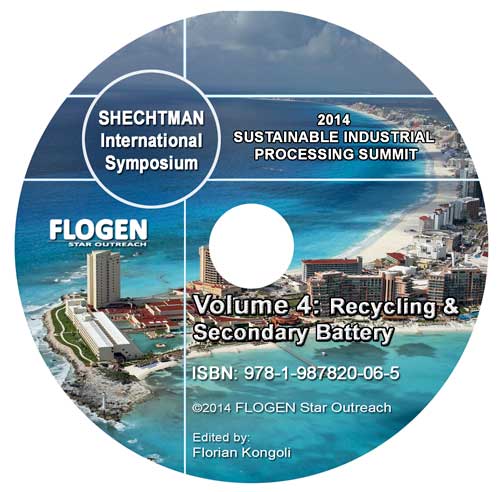2014-Sustainable Industrial Processing Summit
SIPS 2014 Volume 1: Mining
| Editors: | Kongoli F |
| Publisher: | Flogen Star OUTREACH |
| Publication date: | 20 December 2014 |
| Pages: | 424 pages |
| ISBN: | 978-1-987820-03-4 |
| ISSN: | 2291-1227 (Metals and Materials Processing in a Clean Environment Series) |

CD shopping page
Open Pit and Undergound Mining: A Mixed Method For Small Mineral Exploration On Pegmatitie Boddies Of Central Borborema Province, in Paraiba, Brazil
Francisco Souza1; Paulo Sales2; Antonio Sobrinho3;1IFPB, Campina Grande, Brazil; 2IFPB, Picui, Brazil; 3ESCOLA ESTADUAL PADRE JERONIMO, Santa Luzia, Brazil;
Type of Paper: Regular
Id Paper: 368
Topic: 1
Abstract:
Frei Martinho, Picu and Pedra Lavrada are towns in Paraiba State whose main primary economy is the mineral activity, as the semi-arid climate does not favor the agricultural practice. The mentioned towns are seated in the central portion of Borborema Province, where pegmatite zoned bodies are intrusive in mica-schist of Serido Formation. In addition to industrial minerals (quartz, feldspar, muscovite), there are also rare minerals (beryl, tourmaline, aquamarine, tantalite) used as gems or in the electronic industry. The mining is made by gold miners, as the small dimensions of ore bodies do not allow the installation of midsize and large enterprises. As a result of it, so far, there is not a systematic research planning, mining, safety at work, recovery of degraded areas. The pegmatites usually occur in structural highs, i.e., on the hinges and flanks of anticlines, facilitating open pit mining for industrial minerals and rare minerals associated. The underground mining is done as a continuity of surface mining, where concentrations of rare minerals occur at depths greater than those reached by the rudimentary methods of disassembly. Two-hundred meters deep wells are built, and they have difficult access, offering dangers to the miners. Due to socio-economic and industrial importance of prospecting activity in the area, the present study will address strategies for improvements in the general working conditions in gold digging, such as sustainability, security, environment, and health and life quality.